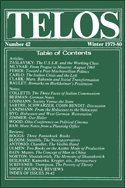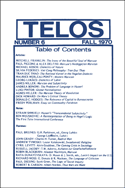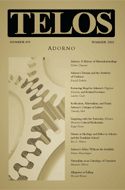By Telos Press · Tuesday, July 11, 2023 In today’s episode of the Telos Press Podcast, David Pan talks with Stephen Muecke about his article “Belonging in Aboriginal Australia: A Political ‘Cosmography,'” from Telos 202 (Spring 2023). An excerpt of the article appears here. In their conversation they discuss how cosmography rather than ethnography allows for a focus on epistemological and ontological pluralism, and what such pluralism means for the essay’s cosmographic analysis; whether ontological pluralism is fundamentally incompatible with monotheistic religion and the institutions that have derived from it; how important for the essay’s analysis is institutional belonging, and whether the centering effect of such belonging could conflict with an ontological pluralism; how Native Title in the Australian legal system is grounded in the idea of genealogy, and whether this orientation undermines or contradict the forms of title and territorial sovereignty documented in Goolarabooloo practices; and the key differences between the Goolarabooloo practices and Yawuru nationalism. If your university has an online subscription to Telos, you can read the full article at the Telos Online website. For non-subscribers, learn how your university can begin a subscription to Telos at our library recommendation page. Print copies of Telos 202 are available for purchase in our online store.
Continue reading →
The vulnerability we confront in the Anthropocene is what Jonathan Lear has called ontological vulnerability: the possible collapse of our world, that is, the collapse of the taken-for-granted way of life that guides and orients us in our everyday practices. In this paper, we take up Lear’s claim that in the face of the impending collapse of one’s world, a peculiar form of hope, radical hope, is called for. According Lear, radical hope means holding on to a “commitment only to the bare possibility that, from this disaster something good will emerge.”
Continue reading →
By Robert Wyllie · Tuesday, October 22, 2013 As an occasional feature on TELOSscope, we highlight a past Telos article whose critical insights continue to illuminate our thinking and challenge our assumptions. Today, Robert Wyllie looks at Alain Manville’s “Hegel and Metaphysics,” from Telos 42 (Winter 1979).
 In “Hegel and Metaphysics,” Alain Manville joins the echelon of French theorists who attempt to focalize Hegelianism around one core concept. In the vanguard, Jean Wahl turned unhappy consciousness into an organizing principle for reading Hegel. More famously, Alexandre Kojève pared Hegelianism down to the core master-slave dialectic. Manville focuses upon the annihilation of metaphysics in Hegel’s speculative recognition that being equals nothingness. Speculative thought transcends the understanding (Vernunft), which sees only an ontological contradiction. Hegel dismisses Vernunft and metaphysics, Manville argues, to grasp concrete reality in a postmetaphysical sense. In “Hegel and Metaphysics,” Alain Manville joins the echelon of French theorists who attempt to focalize Hegelianism around one core concept. In the vanguard, Jean Wahl turned unhappy consciousness into an organizing principle for reading Hegel. More famously, Alexandre Kojève pared Hegelianism down to the core master-slave dialectic. Manville focuses upon the annihilation of metaphysics in Hegel’s speculative recognition that being equals nothingness. Speculative thought transcends the understanding (Vernunft), which sees only an ontological contradiction. Hegel dismisses Vernunft and metaphysics, Manville argues, to grasp concrete reality in a postmetaphysical sense.
Continue reading →
By J. F. Dorahy · Monday, December 31, 2012 As an occasional feature on TELOSscope, we highlight a past Telos article whose critical insights continue to illuminate our thinking and challenge our assumptions. Today, J. F. Dorahy looks at Georg Lukács’s “The Dialectic of Labor: Beyond Causality and Teleology,” from Telos 6 (Fall 1970).
 Georg Lukács’s essay “The Dialectic of Labor” belongs to the last period of his life and was composed in the context of the so-called “renaissance of Marxism”: a movement, beginning in the mid-1950s, within several of the Eastern Bloc nations—most notably Hungary, Poland, and the former Yugoslavia—that sought to re-energize the humanistic dimensions of Marxism suppressed by the enforcement of orthodoxy. Lukács’s substantive contribution to the “renaissance of Marxism” took the form of two enormous projects: a Marxist ontology (Zur Ontologie des gesellschaftichen Seins) and a systematic aesthetics (Die Eigenart des Ästhetischen). Although Lukács’s relationship to “dialectical and historical materialism” remains complex, “The Dialectic of Labor” stands as a reflection of this humanistic tendency inasmuch as it, by way of an ontological elucidation of the “philosophy of praxis,” emphasizes the functional role of subjectivity as a constitutive moment in the social-historical process. Georg Lukács’s essay “The Dialectic of Labor” belongs to the last period of his life and was composed in the context of the so-called “renaissance of Marxism”: a movement, beginning in the mid-1950s, within several of the Eastern Bloc nations—most notably Hungary, Poland, and the former Yugoslavia—that sought to re-energize the humanistic dimensions of Marxism suppressed by the enforcement of orthodoxy. Lukács’s substantive contribution to the “renaissance of Marxism” took the form of two enormous projects: a Marxist ontology (Zur Ontologie des gesellschaftichen Seins) and a systematic aesthetics (Die Eigenart des Ästhetischen). Although Lukács’s relationship to “dialectical and historical materialism” remains complex, “The Dialectic of Labor” stands as a reflection of this humanistic tendency inasmuch as it, by way of an ontological elucidation of the “philosophy of praxis,” emphasizes the functional role of subjectivity as a constitutive moment in the social-historical process.
Continue reading →
By Maurizio Meloni · Friday, July 22, 2011 Maurizio Meloni’s “Naturalism as an Ontology of Ourselves” appears in Telos 155 (Summer 2011). Read the full version online at the Telos Online website, or purchase a print copy of the issue in our store.
 Scientific naturalism, according to Jürgen Habermas, represents one of the “two countervailing trends that mark the intellectual tenor of our age,” the other being religious worldviews. Using Foucault’s distinction between philosophy as an “analytic of truth” and philosophy as an “ontology of the present” and “ontology of ourselves,” this essay addresses naturalism less as an epistemological issue than as a global way of rethinking humanness, that is as the theoretical “correlative” of certain local practices, which, under the influence of leading sciences such as neuroscience and molecular biology, contribute today to the naturalization of the human. In the second part of the essay, I will discuss three hermeneutic models through which leading Continental thinkers have reacted to this intertwinement of naturalism and the human condition in modernity: naturalism as a break, as a danger, and as a loss. From their reactions, the antinaturalistic legacy of much of Continental philosophy emerges clearly, and invites us to think of the present naturalistic epoch in a more radical way. Scientific naturalism, according to Jürgen Habermas, represents one of the “two countervailing trends that mark the intellectual tenor of our age,” the other being religious worldviews. Using Foucault’s distinction between philosophy as an “analytic of truth” and philosophy as an “ontology of the present” and “ontology of ourselves,” this essay addresses naturalism less as an epistemological issue than as a global way of rethinking humanness, that is as the theoretical “correlative” of certain local practices, which, under the influence of leading sciences such as neuroscience and molecular biology, contribute today to the naturalization of the human. In the second part of the essay, I will discuss three hermeneutic models through which leading Continental thinkers have reacted to this intertwinement of naturalism and the human condition in modernity: naturalism as a break, as a danger, and as a loss. From their reactions, the antinaturalistic legacy of much of Continental philosophy emerges clearly, and invites us to think of the present naturalistic epoch in a more radical way.
Continue reading →
|
|
 In “Hegel and Metaphysics,” Alain Manville joins the echelon of French theorists who attempt to focalize Hegelianism around one core concept. In the vanguard, Jean Wahl turned unhappy consciousness into an organizing principle for reading Hegel. More famously, Alexandre Kojève pared Hegelianism down to the core master-slave dialectic. Manville focuses upon the annihilation of metaphysics in Hegel’s speculative recognition that being equals nothingness. Speculative thought transcends the understanding (Vernunft), which sees only an ontological contradiction. Hegel dismisses Vernunft and metaphysics, Manville argues, to grasp concrete reality in a postmetaphysical sense.
In “Hegel and Metaphysics,” Alain Manville joins the echelon of French theorists who attempt to focalize Hegelianism around one core concept. In the vanguard, Jean Wahl turned unhappy consciousness into an organizing principle for reading Hegel. More famously, Alexandre Kojève pared Hegelianism down to the core master-slave dialectic. Manville focuses upon the annihilation of metaphysics in Hegel’s speculative recognition that being equals nothingness. Speculative thought transcends the understanding (Vernunft), which sees only an ontological contradiction. Hegel dismisses Vernunft and metaphysics, Manville argues, to grasp concrete reality in a postmetaphysical sense.  Georg Lukács’s essay “The Dialectic of Labor” belongs to the last period of his life and was composed in the context of the so-called “renaissance of Marxism”: a movement, beginning in the mid-1950s, within several of the Eastern Bloc nations—most notably Hungary, Poland, and the former Yugoslavia—that sought to re-energize the humanistic dimensions of Marxism suppressed by the enforcement of orthodoxy. Lukács’s substantive contribution to the “renaissance of Marxism” took the form of two enormous projects: a Marxist ontology (Zur Ontologie des gesellschaftichen Seins) and a systematic aesthetics (Die Eigenart des Ästhetischen). Although Lukács’s relationship to “dialectical and historical materialism” remains complex, “The Dialectic of Labor” stands as a reflection of this humanistic tendency inasmuch as it, by way of an ontological elucidation of the “philosophy of praxis,” emphasizes the functional role of subjectivity as a constitutive moment in the social-historical process.
Georg Lukács’s essay “The Dialectic of Labor” belongs to the last period of his life and was composed in the context of the so-called “renaissance of Marxism”: a movement, beginning in the mid-1950s, within several of the Eastern Bloc nations—most notably Hungary, Poland, and the former Yugoslavia—that sought to re-energize the humanistic dimensions of Marxism suppressed by the enforcement of orthodoxy. Lukács’s substantive contribution to the “renaissance of Marxism” took the form of two enormous projects: a Marxist ontology (Zur Ontologie des gesellschaftichen Seins) and a systematic aesthetics (Die Eigenart des Ästhetischen). Although Lukács’s relationship to “dialectical and historical materialism” remains complex, “The Dialectic of Labor” stands as a reflection of this humanistic tendency inasmuch as it, by way of an ontological elucidation of the “philosophy of praxis,” emphasizes the functional role of subjectivity as a constitutive moment in the social-historical process.  Scientific naturalism, according to Jürgen Habermas, represents one of the “two countervailing trends that mark the intellectual tenor of our age,” the other being religious worldviews. Using Foucault’s distinction between philosophy as an “analytic of truth” and philosophy as an “ontology of the present” and “ontology of ourselves,” this essay addresses naturalism less as an epistemological issue than as a global way of rethinking humanness, that is as the theoretical “correlative” of certain local practices, which, under the influence of leading sciences such as neuroscience and molecular biology, contribute today to the naturalization of the human. In the second part of the essay, I will discuss three hermeneutic models through which leading Continental thinkers have reacted to this intertwinement of naturalism and the human condition in modernity: naturalism as a break, as a danger, and as a loss. From their reactions, the antinaturalistic legacy of much of Continental philosophy emerges clearly, and invites us to think of the present naturalistic epoch in a more radical way.
Scientific naturalism, according to Jürgen Habermas, represents one of the “two countervailing trends that mark the intellectual tenor of our age,” the other being religious worldviews. Using Foucault’s distinction between philosophy as an “analytic of truth” and philosophy as an “ontology of the present” and “ontology of ourselves,” this essay addresses naturalism less as an epistemological issue than as a global way of rethinking humanness, that is as the theoretical “correlative” of certain local practices, which, under the influence of leading sciences such as neuroscience and molecular biology, contribute today to the naturalization of the human. In the second part of the essay, I will discuss three hermeneutic models through which leading Continental thinkers have reacted to this intertwinement of naturalism and the human condition in modernity: naturalism as a break, as a danger, and as a loss. From their reactions, the antinaturalistic legacy of much of Continental philosophy emerges clearly, and invites us to think of the present naturalistic epoch in a more radical way. 






